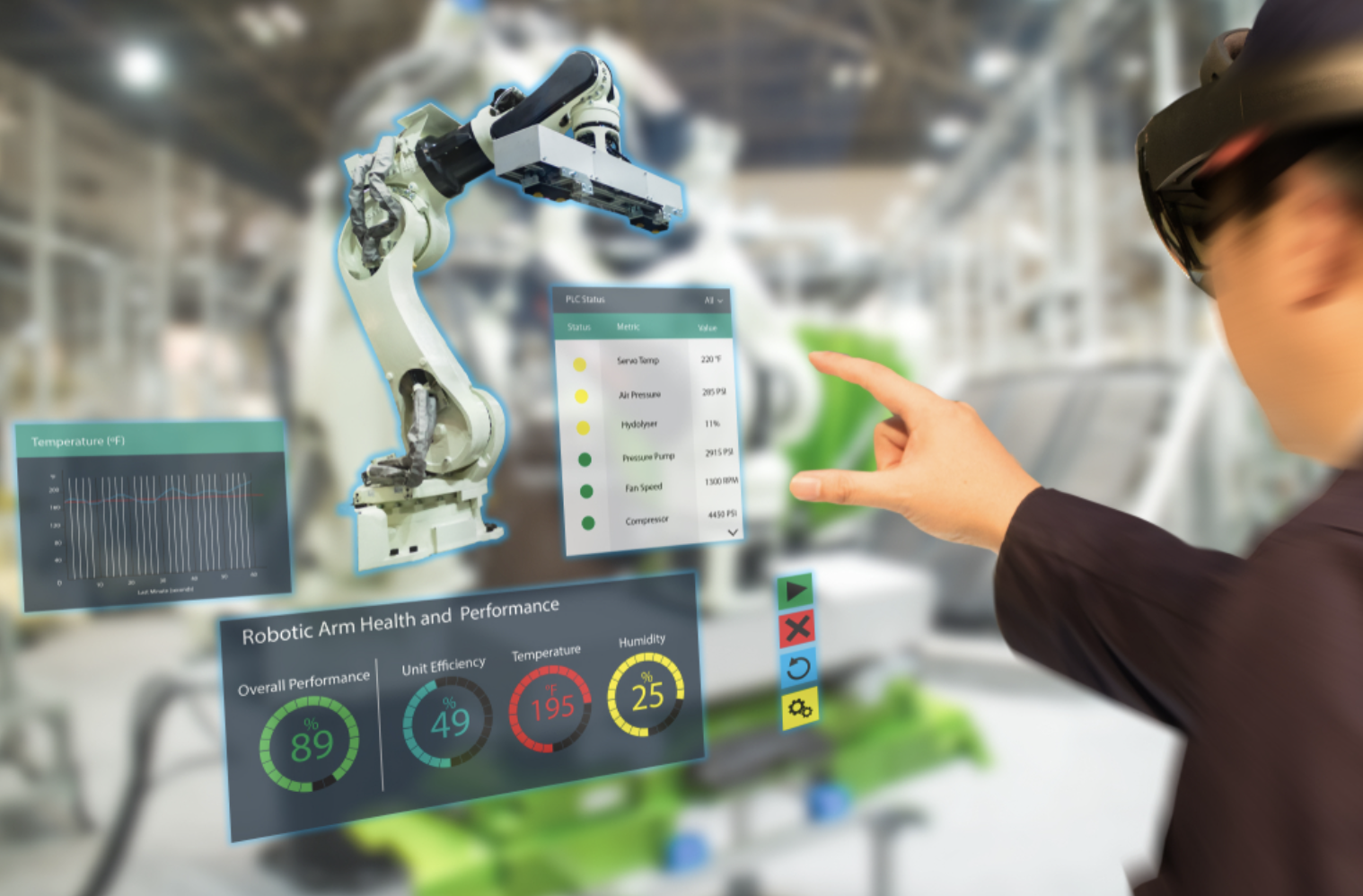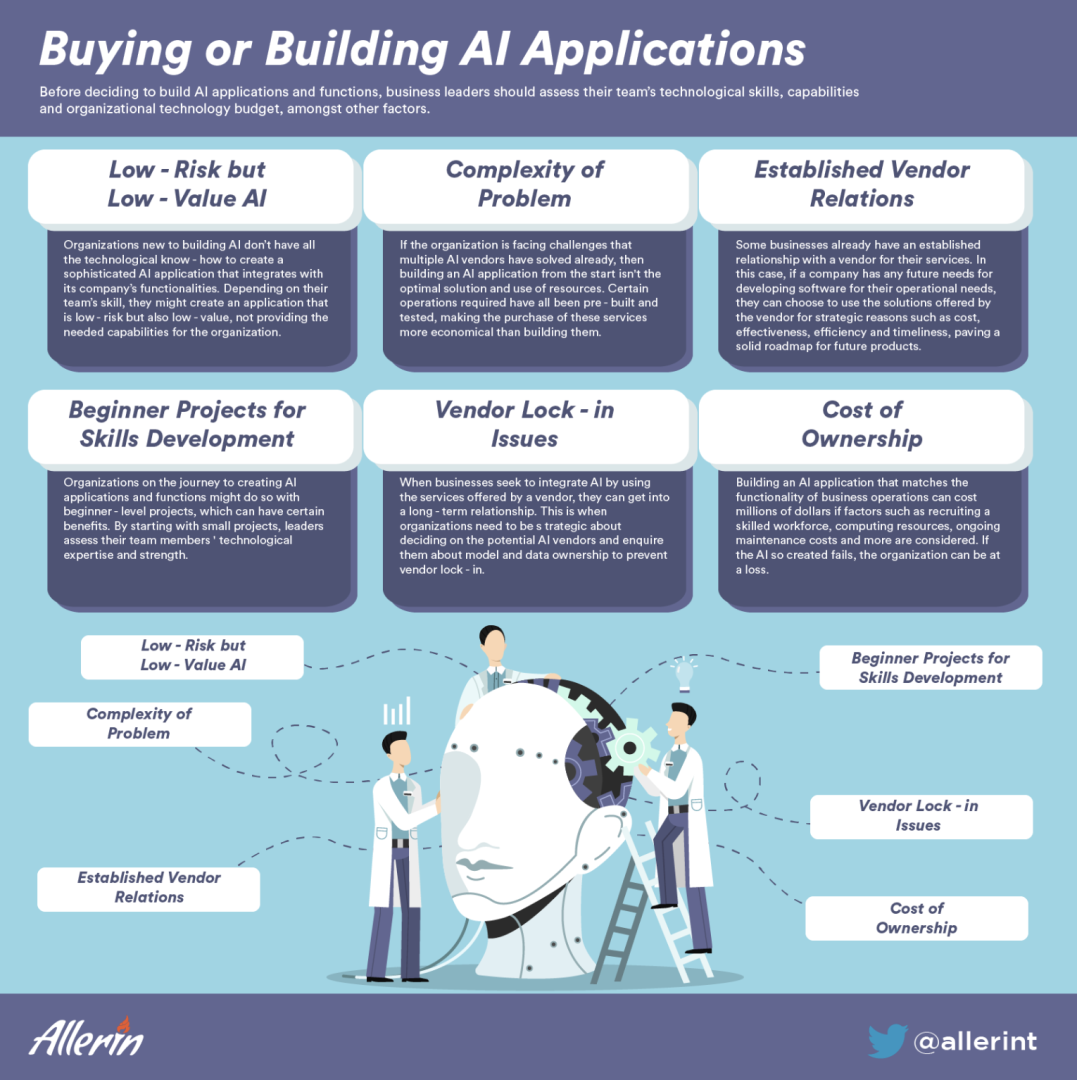Comments
- No comments found

Artificial Intelligence (AI) has become an increasingly important tool for businesses seeking to improve efficiency and gain a competitive advantage.
As the benefits of AI become more apparent, many organizations are considering whether to buy or build AI applications and functions. Both approaches have their advantages and disadvantages, and the decision will depend on a range of factors.
Before deciding to build AI applications and functions, business leaders should assess their team’s technological skills, capabilities and organizational technology budget, amongst other factors.
Artificial Intelligence is expected to create a global economic boost of $15.7 trillion. Integrating AI applications and functionalities can be done in two ways by a leader - by building it from the ground up or buying it from a vendor. Although, not all organizations possess the finance or resources to create customized AI functions and applications for their organizational needs.
When deciding whether to buy or build AI, companies must keep in mind various factors, including their budget, available technology talent in their organization, timeframe, problems they would mitigate with AI, and dependency on vendors or vendor lock-in.
Prior to making a decision on whether to buy or build AI applications, organizational leaders should assess the pros and cons of both.

Organizations new to building AI don’t have all the technological know-how to create a sophisticated AI application that integrates with its company’s functionalities. Depending on their team’s skill, they might create an application that is low-risk but also low-value, not providing the needed capabilities for the organization. Therefore, companies might want to start off their AI projects with a vendor, as their offerings and services might mitigate the challenges that develop from building a low-value AI, and get the organization started on a path to understanding AI.
If the organization is facing challenges that multiple AI vendors have solved already, then building an AI application from the start isn't the optimal solution and use of resources. Certain operations required, such as chatbot software, computer-vision products and natural language processing, have all been pre-built and tested, making the purchase of these services more economical than building them.
Some businesses already have an established relationship with a vendor for their services. In this case, if a company has any future needs for developing software for their operational needs, they can choose to use the solutions offered by the vendor for strategic reasons such as cost, effectiveness, efficiency and timeliness, paving a solid roadmap for future products.
Organizations on the journey to creating AI applications and functions might do so with beginner-level projects, which can have certain benefits. By starting with small projects, leaders assess their team members' technological expertise and strength. They can allocate a certain amount of resources for the development of such a project and find out its efficacy. Depending on the results, this will be an excellent point for the workforce to hone their skills, benefitting them and the company for future and more significant projects.
When businesses seek to integrate AI by using the services offered by a vendor, they can get into a long-term relationship. This is when organizations need to be strategic about deciding on the potential AI vendors and enquire them about model and data ownership to prevent vendor lock-in. This can be costly and undesirable for organizations if the answers aren’t matching their needs, as they might not be able to switch to a different vendor.
In a situation where the thought processes of a vendor and organization are at different levels, companies should think about building their applications. Since AI is advancing rapidly, establishing a long-term relationship with a vendor might become a bane if the vendor selected can’t keep up with the pace of adapting. Many organizations seek not to invest in new vendor relationships if there is a risk of creating new and brittle dependencies.
One of the most crucial questions to be addressed while deciding on building or buying AI applications, organizations should consider the cost-effectiveness of it all. Building an AI application that matches the functionality of business operations can cost millions of dollars if factors such as recruiting a skilled workforce, computing resources, ongoing maintenance costs and more are considered. If the AI so created fails, the organization can be at a loss.
AI is fast advancing and industries globally are seeing its benefits. The race to be the cream of the crop amongst competitors is fierce, and AI is a tool that can help them achieve their goals quicker if leveraged correctly. When buying or building AI applications, organizations must conduct thorough research and analysis on the vendors and their internal resources. If building AI applications, leaders need to understand the strengths and limitations of their workforce, overall technological budget, the long-term maintenance and supporting cost of their own AI applications and their compatibility with business operations. However, if the organization decides to use services extended by a vendor, extensive market research and clarification of thoughts between both parties to match is essential so that the organization doesn’t fall prey to vendor lock-in. For some companies, it may not be an either-or situation, but they would instead choose to build their own AI and use a vendor for certain tasks. By weighing all the factors accurately, the organization will be able to make an informed decision.
Naveen is the Founder and CEO of Allerin, a software solutions provider that delivers innovative and agile solutions that enable to automate, inspire and impress. He is a seasoned professional with more than 20 years of experience, with extensive experience in customizing open source products for cost optimizations of large scale IT deployment. He is currently working on Internet of Things solutions with Big Data Analytics. Naveen completed his programming qualifications in various Indian institutes.
Leave your comments
Post comment as a guest